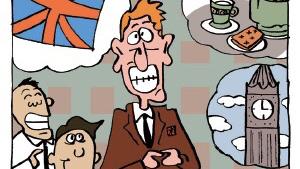Before I started traveling to and then living in China, I wasn’t British. Well, I may have been born and brought up there. And it may have been a British passport with my China visa in it that I was carrying, but I wasn’t overtly aware of being a particular nationality before landing in Beijing. Spending time in China lets you learn not just about the country itself, but leads to some pretty heavy and frequent reflection on one’s own homeland. Over the years, the Chinese people’s stereotypes of what it is to be British have changed considerably, letting me see through their eyes how Britain’s standing in the world has evolved, devolved and almost dissolved.
“Oh, London fog! Afternoon tea!” was the general reaction to my provenance when I first started coming to China in 2001. Whether on a minibus in rural areas or lining up for tickets for the Forbidden City in Beijing, these two observations were almost entirely consistent and somewhat puzzling.
After a bit of clarification both with the local interlocutors and my parents, I confirmed the “London fog” was the terrible smogs of the 1950s. So my national identity was made up roughly by half of pollution that had ended half a century ago, and half by a tea ceremony I’d never taken part in. I was a little jealous of China’s chopsticks, pandas, ping-pong and the Great Wall, which perhaps make up the equivalent British reduction of China.
Almost every time I interacted with someone–waiter, taxi driver, train conductor, old man who’s just crossed eight lanes of traffic to speak to me – I’d be asked where I’m from, something that would take a lot longer to come elsewhere in the world. Heck, it can even be the opening gambit from a stranger in China, forming a no-nonsense hello.
I’d gone from simply going about my daily life in England with only the occasional glimmer of national awareness when renewing my passport or going on holiday, to announcing my nationality up to 50 times a day.
Chinese people of all ages, but most commonly parents pushing school-aged children toward me, were also interested in me for my native tongue. There weren’t that many foreigners in China to go around, and fewer still those who spoke British English, the peculiar dialect which some schools and universities chose to teach. I learned for the first time from disgruntled students that our version of the language we’d inflicted around the world was much harder, as unlike US English, we fail to pronounce half the letters in our words.
As my Chinese improved, I’d hear a little more about my country, typically on the issues of Hong Kong, the notion of the English gentleman and football. I heard less about the fogs as China realized it had its own to worry about, and less about afternoon tea (a shame, as by then I’d actually had some and was more comfortable talking on the subject). China’s fast-growing economy was front of mind for many. China entered the WTO, secured the 2008 Olympics. Britain was instead setting itself up for a financial crisis. While people would still ask where I’m from, the conversation would flip to the strength of the pound, UK housing prices and my salary.
I slowly went from a gentleman linked to a bygone era of perceived colonial greatness, to a business advisor and university application consultant. Neither fitted me particularly well so it was pleasing to realize in the big cities that people were starting to be less interested in my foreignness. I could go a whole day in Beijing without being asked where I was from. I was losing my identity again.
Until 2014’s Scottish Independence Referendum. “Why would you let them have a vote on that?” For the first time there was a thirst for understanding the nuances between the parts that make up the UK, and I became English. Scotland decided to stay within the union, which in terms of talking to people in China, was a bit of a shame, but then at least we weren’t so crazy after all as we must have known they’d vote stay.
The next significant development in what it means to be English/British came quickly. The UK-wide referendum on whether to leave the European Union once again saw a national-level incident have a significant impact on my own identity in China. And this move made me a representative of a nation of idiots at best, more likely an island of the clinically insane. Clearly I was smart enough to get away. In a relatively short time I’d gone from a knight to a blight and await with some trepidation the next obvious milestone in my makeup: leaving the EU in March 2019 and all the potential national embarrassment that will come with it. Maybe I’ll have some Chinese lessons specifically on my defense speech before it happens.

 Old Version
Old Version